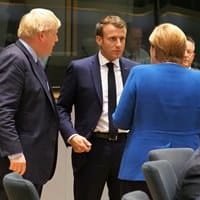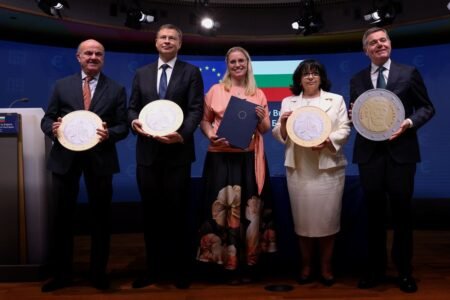(BRUSSELS) – “We’ve got a great new deal that takes back control,” said British prime minister Johnson after EU leaders at a summit Thursday endorsed a revised UK withdrawal agreement and political declaration.
The agreement follows intense negotiations between the Commission and UK negotiators during the last few days, but he EU’s chief negotiator Michel Barnier said he believed they had found “solutions that fully respect the integrity of the Single Market. We created a new and legally operative solution to avoid a hard border, and protect peace and stability on the island of Ireland. It is a solution that works for the EU, for the UK and for people and businesses in Northern Ireland.”
The breakthrough came, said Council president Donald Tusk, because of Ireland’s positive assessment, and because of “Prime Minister Johnson’s acceptance to have customs checks at the points of entry into Northern Ireland. This compromise will allow us to avoid border checks between Ireland and Northern Ireland, and will ensure the integrity of the Single Market.”
“We’ve got a great new deal that takes back control,” said British prime minister Boris Johnson: “now Parliament should get Brexit done on Saturday.”
Before the Withdrawal Agreement can enter into force, it needs to be ratified by the EU and the UK.
The UK’s Parliament is expected to vote on Mr Johnson’s deal in the House of Commons on Saturday, though Northern Ireland’s DUP party has already voiced its opposition to it. At the same time, hundreds of thousands of protesters are expected to demonstrate outside Parliament against Brexit and in favour of giving the public the final say in a ‘People’s Vote’.
The new agreement offers in a revised Protocol a legally operational solution that avoids a hard border on the island of Ireland, protects the all-island economy and the Good Friday (Belfast) Agreement in all its dimensions and safeguards the integrity of the Single Market. According to the Commission, this solution ‘responds to the unique circumstances on the island of Ireland with the aim of protecting peace and stability’.
All other elements of the Withdrawal Agreement remain unchanged in substance, as per the agreement reached on 14 November last year. The Withdrawal Agreement brings legal certainty where the UK’s withdrawal from the EU created uncertainty: citizens’ rights, the financial settlement, a transition period at least until the end of 2020, governance, Protocols on Gibraltar and Cyprus, as well as a range of other separation issues.
In the revised Political Declaration, in terms of regulations, Northern Ireland is set to remain aligned to a limited set of rules related to the EU’s Single Market in order to avoid a hard border: legislation on goods, sanitary rules for veterinary controls (“SPS rules”), rules on agricultural production/marketing, VAT and excise in respect of goods, and state aid rules.
In terms of customs, the EU-UK Single Customs Territory, as agreed in November 2018, has been removed from the Protocol on Ireland / Northern Ireland, at the request of the current UK government. EU and UK negotiators have now found a new way to achieve the goal of avoiding a customs border on the island of Ireland, while at the same time ensuring Northern Ireland remains part of the UK’s customs territory. This agreement fully protects the integrity of the EU’s Single Market and Customs Union, and avoids any regulatory and customs checks at the border between Ireland and Northern Ireland.
Finally, the EU and the UK have agreed to create a new mechanism on ‘consent’, which will give the Members of the Northern Ireland Assembly a decisive voice on the long-term application of relevant EU law in Northern Ireland. The Commission has been in close contact with the Irish government on this point.
In the revised Political Declaration, the main change in the Political Declaration relates to the future EU-UK economic relationship where the current UK government has opted for a model based on a Free Trade Agreement (FTA). The Political Declaration provides for an ambitious FTA with zero tariffs and quotas between the EU and the UK. It states that robust commitments on a level playing field should ensure open and fair competition. The precise nature of commitments will be commensurate with the ambition of the future relationship and take into account the economic connectedness and geographic proximity of the UK.
For the EU, the Council of the European Union must authorise the signature of the Withdrawal Agreement, before sending it to the European Parliament for its consent. The United Kingdom must ratify the agreement according to its own constitutional arrangements.
Special European Council Conclusions
What has the EU agreed with the UK? - background guide








